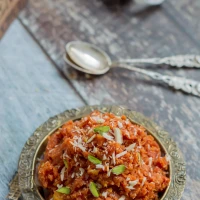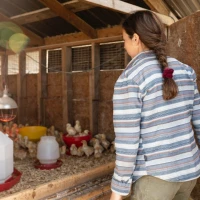When it comes to feeding chickens, there’s a cornucopia of do’s and don’ts that can boggle the mind of any poultry enthusiast. One minute, you’re tossing your feathered friends a handful of grains, and the next, you’re pondering if that juicy, tropical fruit on your countertop could be a tasty treat for them. Mango—the mere mention of this succulent fruit can bring to mind images of exotic summer delights. But when it comes to sharing this sweet treasure with your backyard chickens, is it a good idea? Let’s dive into a topic that has intrigued many chicken keepers: Can chickens eat mango?
In this exhaustive exploration, we will uncover all the facets of whether it’s safe to feed mango to chickens, what benefits it might hold, and any precautions that should be considered. Keep reading to ensure you’re providing your chickens with a diet that’s both delicious and nutritious.
The Nutritional Value of Mango for Chickens
Before delving into whether it’s safe for can chickens eat cabbage to consume mango, let’s understand the nutritional content of this tropical fruit.
Vitamins and Minerals in Mango
Mangoes are packed with an array of vitamins and minerals that are beneficial not just to humans but also to poultry:
- Vitamin A: Essential for good vision and immune health.
- Vitamin C: Supports tissue repair and enzymatic processes.
- Vitamin E: Acts as an antioxidant and aids in cellular function.
- Potassium: Important for muscle control and overall cellular function.
- Fiber: Helps with digestive health.
Given this powerhouse of nutrients, it’s clear that mangoes can serve as more than just a sweet treat for your do chickens have tongues.
Is Mango Safe for Chickens?
Now, the pressing question—is it safe for your chickens to peck at this tropical delight?
Understanding the Safety of Feeding Mango to Chickens
The short answer is yes—mango is generally safe for chicken eating mangos. However, it’s important to take note of the following points:
- Feeding in Moderation: Chickens should only consume mango in moderation to prevent any digestive issues that may arise from overindulgence.
- Seed and Peel Considerations: The pit of a mango should never be given to chickens due to a choking hazard, and there are substances in the peel that can be problematic if consumed in large quantities.
How to Feed Mango to Your Chickens
Introducing mango to your chicken’s diet should be done correctly. Here’s how you can chickens eat cauliflower go about it:
Preparing Mango for Your Flock
- Wash the Mango: Ensure that any pesticides or residues are removed.
- Peel the Mango: To avoid any risks associated with the skin.
- Remove the Pit: Eliminating the possibility of choking or exposure to toxic substances.
- Cut into Small Pieces: This makes it easier for the chickens to eat and digest.
The Benefits of Mango for Chickens
While we’ve established that black and white chickens can indeed enjoy mango, what specific benefits does this fruit offer?
Exploring the Health Advantages for Your Feathered Friends
Mangoes aren’t just a sweet black and white chicken juicy treat; they bring a number of health benefits to the table, including:
- Immune System Boost: Thanks to the high vitamin content, mangoes can help bolster a chicken’s immune system.
- Hydration: During hot weather, the water content in mangoes can help keep chickens hydrated.
- Antioxidant Properties: The presence of antioxidants can aid in fighting free radicals, promoting overall wellness.
By feeding mango as a part of a balanced diet, your chickens can reap these healthful rewards.
Potential Risks of Feeding Mango to Chickens
As with any food, there are potential risks involved when feeding mango to chickens.
Cautionary Measures to Keep in Mind
- Pesticides: Make sure the mangoes are thoroughly washed if not organically sourced.
- Sugar Content: Too much sugar can lead to obesity and other issues in chickens.
- Digestive Upset: Introduce mango gradually to your chickens’ diet to avoid any digestive discomfort.
Being mindful of these risks will help ensure that your chickens enjoy mangoes safely.
Integrating Mango into Your Chicken’s Diet
Now that we’ve looked at both the positives and the considerations, how can you integrate mango into your chicken’s regular diet?
Balancing Mango with Other Foods
A balanced diet is key for the health of your chickens. Here’s how you can include mango:
- As an Occasional Treat: Mango should be a supplement to the main diet, not the main course.
- Combining with Other Fruits and Vegetables: Provide variety to ensure a range of nutrients.
- Ensuring Access to Chicken Feed: Ensure that mangoes aren’t replacing essential feed which provides the staple nutrients needed.
By maintaining a dietary balance, you can safely add some tropical flair to your chickens’ meals.
Frequently Asked Questions About Chickens and Mango
Chicken keepers often have questions when it comes to new foods for their flock.
Answering Your Top Concerns
Here are some questions and answers that might help clear any lingering doubts:
-
Q: How much mango can I feed my chickens at once? A: A small, palm-sized amount per chicken is a safe bet.
-
Q: Can chicks eat mango? A: Chicks should primarily eat starter feed, but tiny bits of mango can be introduced carefully after a few weeks.
-
Q: Will mango affect egg production? A: In moderation, mango should not negatively impact egg production. It might even contribute to healthier eggs due to its nutrient content.
Creative Ways to Serve Mango to Your Chickens
Variety isn’t just the spice of life for humans. Chickens, too, appreciate a change in their diet.
Delicious Mango Treat Ideas for Your Flock
Here are some fun and safe ways to serve mango:
- Frozen Mango Chunks: A refreshing treat in the summer.
- Mango Puree: A soft and easily digestible form, especially for older chickens.
- Mango Mixed with Grains: Add some mango pieces to their regular grain mix for an exciting twist.
By getting creative with how you serve mango, you can delight your poultry pals and keep them interested in their food.
Conclusion: Mango—A Tropical Treat for Chickens
To wrap things up, mango can be a beneficial and safe addition to your chickens’ diet if served properly and in moderation. By understanding the nutritional benefits, potential risks, and how to responsibly introduce this fruit, chicken keepers can ensure their feathered friends enjoy a healthy and varied diet.
Ensuring a Happy and Healthy Flock
Whether you’re a seasoned chicken farmer or new to backyard poultry, it’s clear that mangos are indeed a viable snack for chickens. With this knowledge, you can confidently share a slice of the tropics with your flock. Remember to always monitor your chickens after introducing any new food item, and enjoy watching your chickens relish in the sweet taste of mango.
Feeding your chickens mango isn’t just about adding a splash of sweetness to their lives—it’s about providing them with nutritious variety that supports their well-being. So go on, let your chickens enjoy a peck of mango paradise!










